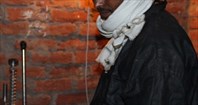Arrests becoming an occupational hazard for pastors in India
Witney, England – Being arrested is becoming a regular occurrence for pastors in India on the back of growing religious nationalism, warns Christian charity Open Doors. Mahesh, a pastor in his early 50s, is troubled with constant false accusations of forcing people to convert to Christianity.
The charity says that more and more pastors in the country face arrest and detention on charges of breaking anti-conversion laws. For many of them it is now ‘part of the job’.
Pastors are being arrested and detained for using ‘fraudulent means’ to convert people to Christianity.
Those who are arrested are seldom convicted, however they are left ostracised and struggling to find work – sometimes for years at a time.
“Because most Christians are never convicted their punishment is never over,” said Asia communications director at Open Doors International Jan Vermeer.
“What happens is, you are arrested, mistreated, held in jail, finally charged and released on bail.
“Anti-conversion laws are often used to discriminate against religious minorities, including Christians and Muslims.
“Christians are often accused of forcibly converting people when they are simply carrying out the normal practices of their faith, such as holding a prayer meeting or even singing Christmas carols.
“Your hearing will be scheduled, you show up, wait for two hours and then hear it has been postponed. This can go on for years.”
It took one church leader, Gaurav*, three years to clear his name in court.
“Meanwhile I had no proper job,” he said. “I was viewed as a criminal by my community and no one wanted to associate with me.
“I worked hard on the little farming land we had and sought some temporary jobs here and there.”
Anti-conversion laws exist in eight of India’s 29 states. While the wording varies in each state, they generally state that ‘no person should convert or attempt to convert, either directly or indirectly, any person from one religion to another by use of force or by allurement or by any fraudulent means’.
According to Jan arrests of pastors and of Christians more generally under the laws are taking place on a monthly basis.
“The lack of convictions under these acts, compared to the significant number of arrests and cases filed against religious minorities, demonstrates the widespread abuse of the law to target religious minorities,” he said.
For Pastor Vikas*, police used loudspeakers – normally only used in pursuit of a violent criminal - to broadcast his arrest. He had been holding a prayer meeting.
Mahesh*, a pastor of a church in India with about 45 members, was also falsely arrested for forcing people to convert to Christianity.
Since his arrest Mahesh has attended a workshop organised by Open Doors’ partners in India on his rights according to the anti-conversion laws.
“Not long after I went on the program, our church was opposed by the locals again and the police were involved,” said Mahesh.
“The people tried to make it a legal matter. But now I was better prepared on how to deal with it and quoted my rights to the authorities, so the problems were sorted out.”
Open Doors is urging the Indian Government to guarantee the peaceful exercise of constitutionally protected rights – including the right to assembly and the right to profess and practice the religion of one’s choosing – which is threatened by state anti-conversion laws and would be threatened by a national anti-conversion law.
*Names changed for security reasons

